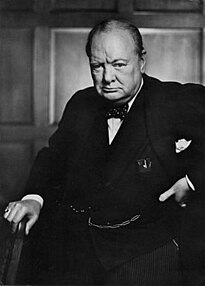 If you were holding a dinner party for historical figures, who would you invite?
If you were holding a dinner party for historical figures, who would you invite?*Pause for thought*
Churchill and Gandhi are quite likely to feature in this imaginary feast and both personalities were great men in their own right. In fact, I admire them both and you might be hard pressed to find someone who didn't. In India, Gandhi's face is still all over their money (ironic given his own poverty and humility) and Churchill is still considered to be the classic representation of British greatness.
However, it can be difficult to get away from these accepted versions of people's personalities. Whilst studying Gandhi at university it felt odd to accept many of his shortcomings as leader and a man (perhaps I'll make it the topic of a future blog post). In the same way, my sixth formers are finding it difficult to get away from their interpretation of Churchill as one of the greatest Britain's who ever lived. Most want to keep their rose-tinted view of him despite my efforts to convince them that at times he was a complete plonker.
This became an easier task when comparing him with Gandhi. Despite both being in some ways great men, if you invited Churchill and Gandhi to your dinner party, they would not get on.
Gandhi is best known for his impassioned appeals for the independence of India from British Imperial rule. He dismissed the use of violence and was willing to take non-violent protest to the extreme. He fasted on a number of occasions to near starvation to try to stop conflicts.
Some have called him a saint or even a "Great Soul" but Churchill described him insultingly as a "half-naked fakir" and stood against every one of his demands. As Prime Minister Churchill even advocated letting Gandhi die if he went on hunger strike whilst in prison. Indeed, Churchill was an old fashioned imperialist who was never going to let India be free whilst he was in power. Before the war he campaigned so vigorously against India that many people wouldn't listen to him over German rearmament.
It's possible to say that Churchill was only a product of his time but even in the 1930s, most people (even the Conservative party) recognised the need for change in India. Churchill's judgement was completely off and he seems to have been exposed as imperialistic, out of date and politically very foolish. Of course for Gandhi, Churchill epitomised the colonial British attitudes which he was fighting hard against.
I think that this interaction between the two great figures is fascinating in its own right but it also got me thinking about who I admire in the past. Is it ok to admire Churchill for his sense of history and fascinating character even if he was probably racist and imperialistic over India? If it is, then how do we reconcile that with an admiration of Gandhi who stands in contrast to almost every one of Churchill's policies?
Sadly, I don't really have an answer to that question except to say that we need to have a complex understanding of our history. There are few major figures without major faults and understanding them makes our study of the past harder but also more legitimate. In fact, simple glorious histories have often been the product of many unsavoury characters across history. Dispelling initial impressions can also be quite enjoyable; perhaps I'll write something more about the other negative sides to both Gandhi and Churchill at a later date.
Some of my sixth formers are yet to be convinced about Winston's (for some reason, Churchill is one of those characters who is allowed to be called by their first name) downsides but their rebuttal of some of my ideas has made the discussion far more engaging. For me, I'd still invite them both to my imaginary dinner party. The awkward silences would definitely be worth it!

